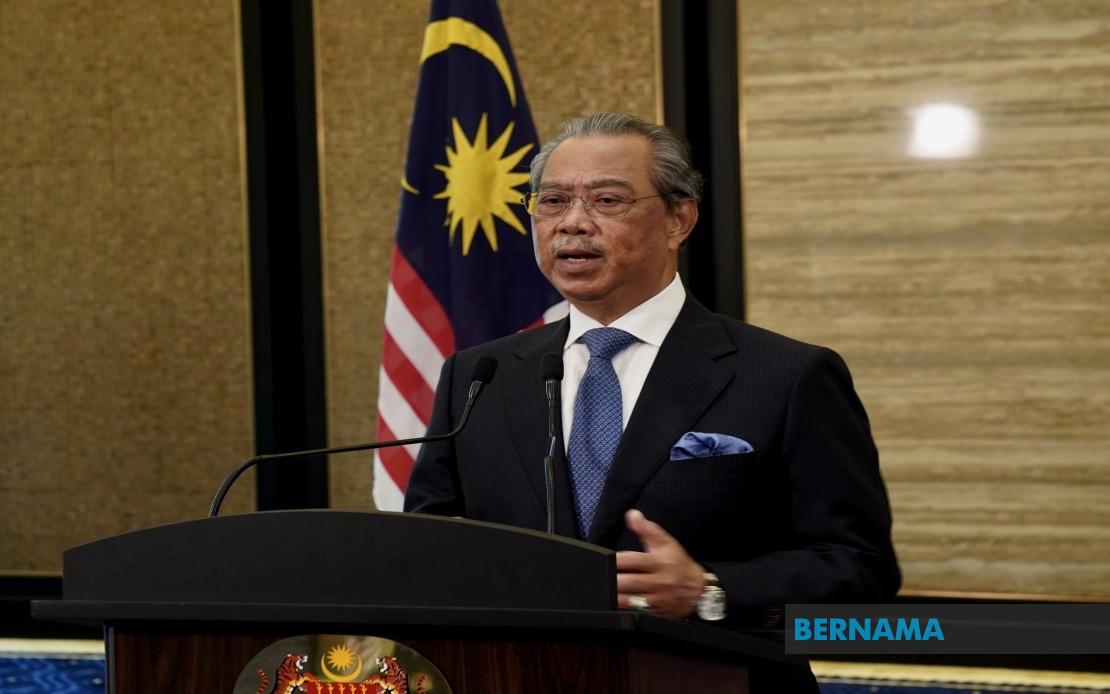News
Natural gas plays pivotal bridging role for energy transition - PM

KUALA LUMPUR, Dec 3 -- Natural gas will continue to help bridge the inevitable energy transition and tackle the issue of climate change faced by the world, said Prime Minister Tan Sri Muhyiddin Yassin.
He said Malaysia's energy mix had been underpinned by natural gas for decades now and would be for the foreseeable future, but the country still had a long way to go in its journey towards a sustainable future.
However, he expressed confidence in the collective minds and abilities to realise the energy transition, ensuring that today’s needs were met while addressing tomorrow’s challenges.
“We look forward towards natural gas to play a pivotal bridging role for this energy transition, providing secure, affordable and sustainable baseload energy source in synergy with the growing, but often intermittent, renewable energy sources.
“This synergy gives rise to significant investment opportunities, not only in upstream but across the value chain,” he said at the 7th International Energy Forum (IEF) – International Gas Union (IGU) Ministerial Gas Forum Virtual Roundtable which was held virtually today.
The Prime Minister said the long-term outlook for gas was brighter than that of other fossil fuels because of its comparatively lower cost and lower emissions from production.
To find a true competitive advantage amid a volatile market, gas players must re-focus their efforts in capital efficiency, supply-chain optimisation, downstream market development, de-carbonisation as well as digital and advanced analytics, he said.
“If done successfully, I believe gas could ride out an unpredictable market and find opportunities for faster growth not only in Malaysia, but the global market as a whole,” he said.
Muhyiddin said technology would play a critical role in order to realise the positive future for gas.
Gas producers, he said, could apply digital and advanced analytic techniques to realise significant hidden value potential.
Only through these tech-investments, the role of natural gas in de-carbonising the energy sector vis-a-vis other energy.
Muhyiddin said governments, in the design and implementation of policies, played a crucial role in shaping such opportunities.
“Much will also depend on the capacity of investors to provide new solutions and navigate risks over the future direction of gas markets and technologies.
“To this end, governments may provide incentives to key stakeholders to accelerate development, commercialisation and production of new technologies for energy transition,” he said.
The Prime Minister said regulatory incentives might play a more effective role in encouraging energy innovation such as “regulatory sandboxes” policies that could create safe spaces for stakeholders in energy innovation to test their solutions in a live, but controlled, environment without being subject to normal regulatory requirements.
He also pointed out that any further financial assistance needed to be used wisely.
As some of the earlier experience with renewable subsidies in advanced markets showed, it could lead to a high taxpayer burden, over-capacity and eventual unsustainable costs for consumers when phased out, if not executed carefully, he added.
Giving an update on Malaysia's efforts in the energy sector, Muhyiddin said a Natural Gas Roadmap (NGR) was currently being developed that would form a key part of the overall National Energy Policy (NEP), which would be announced in the first quarter of next year.
Thus, these upcoming documents would serve as an important policy framework in the energy sector under the 12th Malaysia Plan, 2021-2025, he said.
“The NGR strives to optimise the value of indigenous gas resources, enhance security of supply and access to cost competitive gas, among others,” he said.
Muhyiddin noted that numerous initiatives and infrastructure had been established to further grow the usage of gas within the country and beyond its shores.
Malaysia’s global innovation in gas with the completion of the world’s first operational floating liquefied natural gas (FLNG) facility in 2016 with the capacity to produce 1.2 million tonnes of LNG per year has allowed it to optimise previously stranded gas fields.
This would be followed by the second FLNG which was expected to go into commercial operations next year, he added.
-- BERNAMA
Other News
Sarawak Lepasi Sasaran Kapasiti Gabungan Tenaga Boleh Baharu Tahun Ini - Abang Johari

Oleh Nur Ashikin Abdul Aziz
SINGAPURA, 21 Okt (Bernama) -- Sarawak mencapai 62 peratus sasaran campuran kapasiti tenaga boleh baharu (TBB) tahun ini, melepasi sasaran 60 peratus yang digariskan dalam Strategi Pembangunan Pasca COVID-19 (PCDS) 2030.
Sarawak Pacu Pertumbuhan Tenaga Boleh Diperbaharui Untuk Manfaat ASEAN - Premier

SINGAPURA, 21 Okt (Bernama) -- Sarawak komited menyokong peralihan tenaga boleh diperbaharui di Asia Tenggara dengan memanfaatkan potensinya sebagai "Bateri ASEAN," yang akan membekalkan tenaga bersih menerusi sambungan Grid Kuasa Borneo dan ASEAN.
Belanjawan 2025 Percepat Peralihan Kepada Tenaga Bersih - Solarvest

KUALA LUMPUR, 19 Okt (Bernama) -- Belanjawan 2025 merupakan satu langkah ke arah mempercepat peralihan kepada tenaga bersih di Malaysia, kata Solarvest Holdings Bhd.
© 2025 BERNAMA. All Rights Reserved.
Disclaimer | Privacy Policy | Security Policy This material may not be published, broadcast,
rewritten or redistributed in any form except with the prior written permission of BERNAMA.
Contact us :
General [ +603-2693 9933, helpdesk@bernama.com ]
Product/Service Enquiries [ +603-2050 4466, digitalsales@bernama.com ]